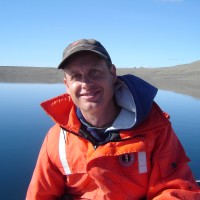
John Chételat
Adjunct Research Professor
| Degrees: | MSc (University of Ottawa), PhD (Université de Montréal) |
| Phone: | 613-991-9835 |
| Email: | john.chetelat@ec.gc.ca |
| Office: | National Wildlife Research Centre (Environment Canada), on the Carleton University campus |
| Website: | Website: Government of Canada Scientist Profile |
Biography:
Dr. John Chételat is a Research Scientist with Environment Canada at the National Wildlife Research Centre, located on the Carleton University campus. His research program focuses on the fate of metal pollution in the environment, using field-based approaches to identify ecosystem responses to these perturbations. He examines geographic gradients to test hypotheses of environmental controls on the movement of metals through aquatic ecosystems and their accumulation in food webs. Dr. Chételat received his Ph.D. in biology from the Université de Montréal and his B.Sc. and M.Sc. in biology from the University of Ottawa. He has studied environmental issues in the Canadian Arctic for over ten years and currently has projects investigating aquatic ecosystems in the Northwest Territories, Nunavut and Nunavik. He also conducts research locally in lakes of Gatineau Park, Quebec.
Research Interests:
- Ecotoxicology of metals (mercury, lead) and other elements (arsenic)
- Metal bioaccumulation in wildlife
- Transfer of metals in food webs
- Arctic limnology
- Environmental applications of stable isotopes
Publications are listed on Google Scholar and ORCID
Student Theses (Completed):
PhD:
Palmer, M.J., 2022. Environmental processes that control the chemical recovery of arsenic impacted northern landscapes. Co-supervision with Murray Richardson. Carleton University.
Pelletier, N., 2021. Paleolimnological characterization of metal(loid) sources and transport processes in Canadian subarctic lakes. Co-supervision with Jesse Vermaire. Carleton University.
MacMillan, G.A. 2018. Hunting for trace metals in a rapidly changing North: limnological, ecological, and collaborative approaches. Co-supervision with Marc Amyot. Université de Montréal.
MSc:
McClelland, C. 2022. Methylmercury dietary pathways and bioaccumulation in benthic invertebrates of the Arctic Ocean. Co-supervision with Mark Forbes. Carleton University.
Peraza Arcila, M. I. 2022. Spatial patterns of mercury accumulation in wolverine (Gulo gulo) across the western Canadian Arctic: Landscape, climate and dietary factors. Co-supervision with Murray Richardson. Carleton University.
Lapins, D., 2022. Environmental change in Yellowknife Bay, Northwest Territories, over the last two centuries inferred through diatom paleolimnological analysis. Co-supervision with Jesse Vermaire. Carleton University.
Astles, B.C., 2021. The Influence of Warmer Temperatures Brought on by Climate Change on the Mobility of Arsenic from Lake Sediments. Co-supervision with Jesse Vermaire. Carleton University.